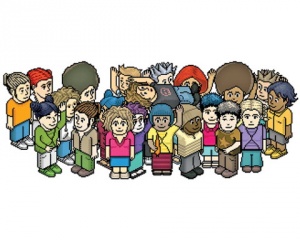Difference between revisions of "Virtual Community"
(→Types of virtual communities) |
|||
| Line 46: | Line 46: | ||
===Social Network Services=== | ===Social Network Services=== | ||
| − | |||
Arguably the most popular type of virtual communities, social networking sites provide a platform for users to connect with other members, who are oftentimes a part of their circles in real life. Facebook, MySpace, and Twitter are all examples of this service. | Arguably the most popular type of virtual communities, social networking sites provide a platform for users to connect with other members, who are oftentimes a part of their circles in real life. Facebook, MySpace, and Twitter are all examples of this service. | ||
| Line 56: | Line 55: | ||
Forums are typically focused around one broad topic such as gaming, art or music. There are also forums dedicated to a wide variety of niche topics like ghostnote.net <ref>http://www.ghostnote.net/vbforum/forum.php</ref>, a niche community forum dedicated to percussive instrument construction. While forums are usually focused on one topic, there exists popular "everything" forums like reddit.com <ref>http://www.reddit.com/</ref> that feature subsections for discussion on numerous different topics such as world news, politics or technology. | Forums are typically focused around one broad topic such as gaming, art or music. There are also forums dedicated to a wide variety of niche topics like ghostnote.net <ref>http://www.ghostnote.net/vbforum/forum.php</ref>, a niche community forum dedicated to percussive instrument construction. While forums are usually focused on one topic, there exists popular "everything" forums like reddit.com <ref>http://www.reddit.com/</ref> that feature subsections for discussion on numerous different topics such as world news, politics or technology. | ||
| − | Forums vary by content type and presentation. Traditional online forums feature a general discussion section as well as subsections dedicated to different subtopics. The traditional forum format presents users with a list of "threads", or user contributed discussion prompts, and information about the threads creators, number of posts and the date/time created. Forums like reddit.com give users the option to create traditional discussion threads as well as links to other sites, images or videos along with a discussion area for the presented content. | + | Forums vary by content type and presentation. Traditional online forums feature a general discussion section as well as subsections dedicated to different subtopics. The traditional forum format presents users with a list of "threads", or user contributed discussion prompts, and information about the threads creators, number of posts and the date/time created. Forums like reddit.com give users the option to create traditional discussion threads as well as links to other sites, images or videos along with a discussion area for the presented content. |
==Impacts of virtual communities== | ==Impacts of virtual communities== | ||
Revision as of 21:59, 12 December 2011
A virtual community is a social network of a group people that shares some common values and a group of interacting people through some form of a virtual avatar. (Back to index)
Contents
Introduction
A community is defined as "a unified body of individuals: as the people with common interests living in a particular area, and an interacting population of various kinds of individuals (as species) in a common location." according to Merriam-Webster dictionary. This definition of a community minus the notation about having a "common location" or "particular area" describes a virtual community. A virtual community is very much the same as a traditional community but instead of sharing a physical area, a virtual community can be linked through many different virtual avenues. Such avenues include Social Networks, Online Chat Rooms, Virtual Worlds, Online Gaming, etc.
Types of virtual communities
Online Gaming
Online gaming communities are popular and typically feature expansive online virtual communities. Interaction in online gaming environments takes place in virtual worlds and is limited by the design of the game's play mechanics. Various types of online game genres exist ranging from shooter to role-playing type games. Interaction inside of virtual worlds ranges by game type and design. Some games offer players more freedom to interact and form relationships with other players, while other games or more focused on completing objectives or winning a match. Players interact via an avatar which visually represents the user's character in the game. Avatars are given customization options that allow the player to portray themselves in-game as they see fit. There are often online forum communities that supplement in-game worlds, allowing players a further level of interaction with other players, developers and the game community as a whole.
MMORPGs
MMORPGs, short for Massively Multiplayer Online Role Playing Games, are one of the most popular current online game genres. MMORPGs feature large sprawling virtual worlds, large populations of players and varying types of play mechanics. Although varying by game, the basic game-play of most MMORPGs involves creating a character, leveling up that character by completing objectives or tasks inside the game world, following the game's story line and interacting with other players within the game environment. Most MMORPGs are in fact role-playing games, where users select a class that dictates their role type within groups of other players. An example of these role types are healers, tanks and damage dealers within the MMORPG World of Warcraft.
A list of current MMORPGs by popularity and playability. [1]
| MMORPGs |
|---|
| World of Warcraft |
| Rift |
| Eve Online |
| Guild Wars |
| Darkfall |
| Aion |
| Lord of the Rings Online |
| Maple Story |
| City of Heroes |
| Champions Online |
| Dark Age of Camalot |
Online Chat Rooms
A virtual community can also consist of being an online chat room. An online chat room can be describe as any form of synchronous conferencing. The term can mean any technology ranging from real-time online chatting over instant messaging and online forums.
Social Network Services
Arguably the most popular type of virtual communities, social networking sites provide a platform for users to connect with other members, who are oftentimes a part of their circles in real life. Facebook, MySpace, and Twitter are all examples of this service.
Online Forums
Online forums are a popular form of virtual community. Online forums, sometimes referred to as "boards", are websites or sections of websites that act as discussion areas where users interact with each other about designated topics. There are various types of forums with different mechanics, but most follow a similar design. Users are asked to register for a forum to allow participation. Users create a profile that typically includes basic information like name, location, interests, links to social networking profiles and an avatar photo. There are also anonymous forums like 4chan.org [2] that don't require users to create a profile to contribute.
Forums are typically focused around one broad topic such as gaming, art or music. There are also forums dedicated to a wide variety of niche topics like ghostnote.net [3], a niche community forum dedicated to percussive instrument construction. While forums are usually focused on one topic, there exists popular "everything" forums like reddit.com [4] that feature subsections for discussion on numerous different topics such as world news, politics or technology.
Forums vary by content type and presentation. Traditional online forums feature a general discussion section as well as subsections dedicated to different subtopics. The traditional forum format presents users with a list of "threads", or user contributed discussion prompts, and information about the threads creators, number of posts and the date/time created. Forums like reddit.com give users the option to create traditional discussion threads as well as links to other sites, images or videos along with a discussion area for the presented content.
Impacts of virtual communities
Ethical Impacts
The sense of anonymity found in virtual communities presents an ethical challenge due to the fact that it is easier for individuals to identify others who are at risk for identity theft or sexual predation. Many of these sites may deal with mature content and it is hard to identify users who are truly at the lawful age to view such content. For example, the popular media site Facebook has a required age of 13 to sign up for an account. There are very limited ways for administrators to ensure that users are of a certain age and a large number of adults have admitted to helping their child gain access to the site even though they are younger than 13 [5].
There is also a problem with inaccurate information being posted in virtual communities. Because a sense of trust is fostered more naturally amongst users of virtual communities due to their shared interests, unreliable and false information can be easily construed to be true.

